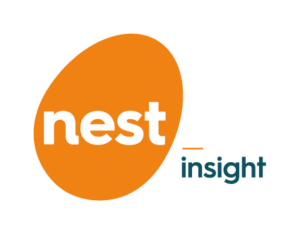More than 3 million households unable to cover more than a month of lost income – but new Nest Insight trials could unlock multiple, scalable support mechanisms
London, U.K. – 13 November 2025 – A major project led by Nest Insight, the public-benefit research and innovation centre, has set out the scale of Britain’s financial resilience challenge and launched multiple real-world trials to find scalable ways of supporting millions of underserved households.
The Financial Resilience project, led by Nest Insight and supported by JPMorganChase, brings together qualitative, quantitative and trial-based analysis to identify ways to support people with low financial resilience – those without the ability to weather present financial shocks and prepare for shocks that might happen in the future. The multi-year project involves 16 organisations including research agencies, frontline support organisations, financial services providers, employers, and people with lived experience of low financial resilience.
Bridging gaps, building resilience – the first of the project’s publications, released today – shares initial learnings on how the UK financial system is – and isn’t – working for those with low resilience. Through a bespoke set of resilience measures and Office for National Statistics (ONS) data, the publication highlights that 3.1 million households would struggle to cope with more than a month of lost income. Drawing on a landscape review and qualitative interviews and studies with more than 100 experts by profession and by experience, the publication sets out four ‘states of shock’: the scenarios people experience after a financial shock, in which the financial system sometimes does more harm than good.
In partnership with employers, employee benefits providers and credit unions, multiple real-world trials have now been launched to evaluate ways of supporting people before, during and after those states of shock: in particular, to evaluate areas of potential such as borrowing-and-savings ‘hybrid’ solutions, where people are supported to start saving and build financial resilience at different points in their borrowing journey. The team also aims to better understand providers’ perspectives on the feasibility and commercial viability of solutions, as well as any regulatory considerations.
Sope Otulana, Associate Director of Research and Innovation at Nest Insight, said,
“Despite many households’ best efforts to manage high or unexpected expenses, or a loss of income, the options currently available can leave them more vulnerable, more indebted, less able to save, or stuck repeating patterns.
“We believe there is an opportunity to expand the options available to households on low and moderate incomes, including through joined-up debt and savings solutions, targeted loans, and solutions that offer greater flexibility for managing variable pay. Being able to meet a precarious financial moment with options that help you progress, rather than being further set back, is the core of resilience.”
Tracy, Nest Insight ‘Experts in Action’ panel member, comments:
“Right now, more and more people are struggling financially…You can have a plan, but it’s the in-betweens, the unexpected repair or something that needs to be purchased, that throws you out of sync, that causes spirals.
It’s not a secret anymore: money troubles are everywhere. That’s why this project matters. If people aren’t financially resilient, it bleeds into every part of their lives and all parts of society; it needs to be addressed…Not everything can be fixed, but these ideas that link to big issues affecting the majority of people in this country could help people move forward. However, they need to be simple, clear, and designed with real lives in mind. People’s circumstances change, and tools need to change with them.”
ENDS
Notes to editors
For media enquiries, contact:
Clare Hodgkinson: clare.hodgkinson@nestcorporation.org.uk
For information on the Financial Resilience project:
- Nest Insight website
- Publication: Bridging gaps, building resilience (PDF), Executive summary (PDF)
- Research Preview:
About the research
Nest Insight defines financial resilience as the ability to weather present financial shocks and prepare for shocks that might happen in the future. It’s about individuals and households, and how the options available to them within the financial system can either take them backwards, keep them in a reactive cycle, or help propel them towards financial stability, depending on how they are designed and accessed.
Bridging gaps, building resilience is the first publication from the Financial Resilience project, led by Nest Insight and supported by JPMorganChase.
The publication’s analysis draws on:
- A landscape review of 87 pieces of literature
- A study on drivers of resilience – including tasks, interviews and focus groups – with 50 participants, in partnership with Quadrangle
- A study on ethnicity, gender and intersecting vulnerabilities – including ethnographic activities, interviews and focus groups – with 32 participants, in partnership with Clearview Research
- Interviews with 23 experts by profession from policy, financial services and research
- Discussions with 20 experts by experience, from Nest Insight’s ‘Experts in Action’ panel.
About Nest Insight’s Expert in Action panel
Nest Insight’s ‘Experts in Action’ is a group of individuals living on low and moderate incomes. They come from a range of backgrounds and have diverse circumstances. All have participated in previous Nest Insight research projects, working with us to ensure that lived experience is at the heart of our work. As experts by experience, they inform and challenge our thinking alongside the experts by profession we also consult with. The views of the Experts in Action are views of experts by experience, rather than the views of Nest Insight or our partners.
The scale of the resilience challenge
Using Nest Insight’s measures of financial resilience, our analysis finds that millions of people in the UK live in households with low resilience and would struggle to manage both smaller and more significant financial shocks.
- Resilience to small or moderate financial shocks: 1.1 million working households on low and moderate incomes (nearly 11%) have less than £250 in accessible savings.
- Resilience to larger income-loss shocks: 3.1 million households would struggle to cope with more than a month of lost income:
- 1.4 million households on low and moderate incomes, where the head of the household is employed, do not have enough in savings to cover more than a week of lost income.
- a further 1.7 million households only have enough in savings to cover between a week and a month of lost income.
About Nest Insight

Nest Insight is a public-benefit research and innovation centre. Our mission is to find ways to support people to be financially secure, both today and into retirement. We conduct rigorous, cutting-edge research, working collaboratively with industry and academic partners to understand the financial challenges facing low- and moderate-income households. We use these data-driven insights to identify and test practical, real-world solutions. Our findings are shared widely and freely so that people around the world can benefit from our work.
Nest Insight’s research programme is made possible through the support of its strategic partners: the BlackRock Foundation, JPMorganChase, the Money and Pensions Service, and Nest.
For more information, visit: nestinsight.org.uk
About our programme partner

With a legacy dating back more than 200 years, JPMorganChase has a track record of demonstrating leadership during times of both economic growth and financial instability.
The firm employs approximately 22,000 employees throughout the U.K. and is committed to operating a healthy and vibrant company that plays a leading role in advancing a sustainable and inclusive economy. The firm provides £600 billion in credit and capital to nearly 4,500 medium and large companies and supports over two million retail customers. At the same time, together with its non-profit partners the firm has supported over 33,000 low income households reduce their debt and improve their financial health, helped over 10,800 small businesses to grow their activity and placed over 9,800 individuals into apprenticeships or full and part-time employment.
For more information, visit: jpmorganchase.com







